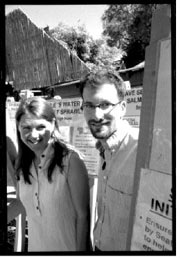ARMED WITH LAWYERS, review committees, and alternative ballot proposals, City Hall has gone all out in hopes of heading off a proposed Seattle water conservation initiative.
But, come November, city voters may yet have their say on Initiative 63. The initiative would raise water rates for the city’s water hogs—the biggest residential and business water users—and use the proceeds to fund expanded water conservation programs for poor people. The initiative requires that water saved through this and other conservation efforts be left in streams and rivers for salmon, and stipulates that it cannot be used to serve new suburban development.
The Seattle City Council, with I-63 critic and Council President Margaret Pageler leading the charge, is almost certain to put on the ballot next to I-63 its own water conservation measure—a kind of I-63 Lite. If both receive more than 50 percent of the vote, the higher vote getter will be implemented. The City Council will probably take action on the ballot alternative on Sept. 10.
I-63 proponents see the council’s alternative measure as just the latest roadblock tossed in the initiative’s path. “It’s pretty clear that there are a lot of folks on the City Council who have a lot of contempt for the initiative process,” says Knoll Lowney, co-chair of Yes for Seattle, the environmental group sponsoring the initiative.
In an unusual proceeding, the city has also filed suit against Yes for Seattle in King County Superior Court, challenging the legality of some initiative provisions (King County and county election chief Bob Bruce are also defendants in the suit). Seattle hopes to obtain a ruling that I-63 addresses matters beyond the scope of the initiative power, and to convince the court to issue a permanent injunction barring King County from ever placing it on the ballot. Lowney calls the suit “frivolous.”
In yet another unusual proceeding, a 13-member panel has completed the city’s first official review of a ballot initiative. The so-called Citizen Analysis Panel’s August 29 report contains a matrix of panelists’ opinions on the positive and negative aspects of I-63. It also includes a statement signed by 10 panelists stating that I-63 “creates a program that may prove to be counterproductive.”
Pageler’s critics say she stacked the deck in choosing members for the I-63 review panel. In late June she sponsored the legislation authorizing the panel (a bill that assigned the council president—that would be herself—the power to select members).
Why all the special attention? For starters, I-63 has the look of a winner. Even opponents acknowledge that Yes for Seattle polls showing more than 70 percent support for the measure are probably accurate. Rather than fight I-63, Pageler and the initiative’s other city critics are deploying a variety of weapons against it.
Pageler, long the council’s water guru, says her alternative ballot measure, like I-63, would establish a program to reserve water saved through conservation measures to benefit salmon runs. Her proposal would also enhance the city’s water conservation programs for low-income residents, but, she stresses, it wouldn’t interfere with the city’s existing water contracts with the suburbs. “It’s an alternative that does the same thing,” she says. “What it doesn’t do is interfere with existing contracts or set [water] rates by initiative.”
Lowney says Pageler’s alternative proposals are merely a tactical move to defeat I-63. “It’s easier to say ‘Vote yes’ and confuse the voters than run a no campaign,” he says. “You can easily split the vote and cause both to fail.” The existing I-63 opposition group, Responsible Water Stewardship, has little more than a post office box and a $7,562 debt to local political consultants Gogerty Stark Marriott.
Ironically, the city has already partially implemented one element of I-63. The council voted in June to stick it to the city’s biggest residential water hogs both this summer and next. I-63 goes further, however, proposing that the rate hike be extended to large commercial water users as well.
Lowney says that despite the City Hall shenanigans, voters support the basic concept of I-63—that water saved through conservation efforts should benefit fish, not serve sprawling new suburban development. “They want people to talk about anything but the real issue,” says Lowney, “which is that people want their conservation to benefit the environment.”






